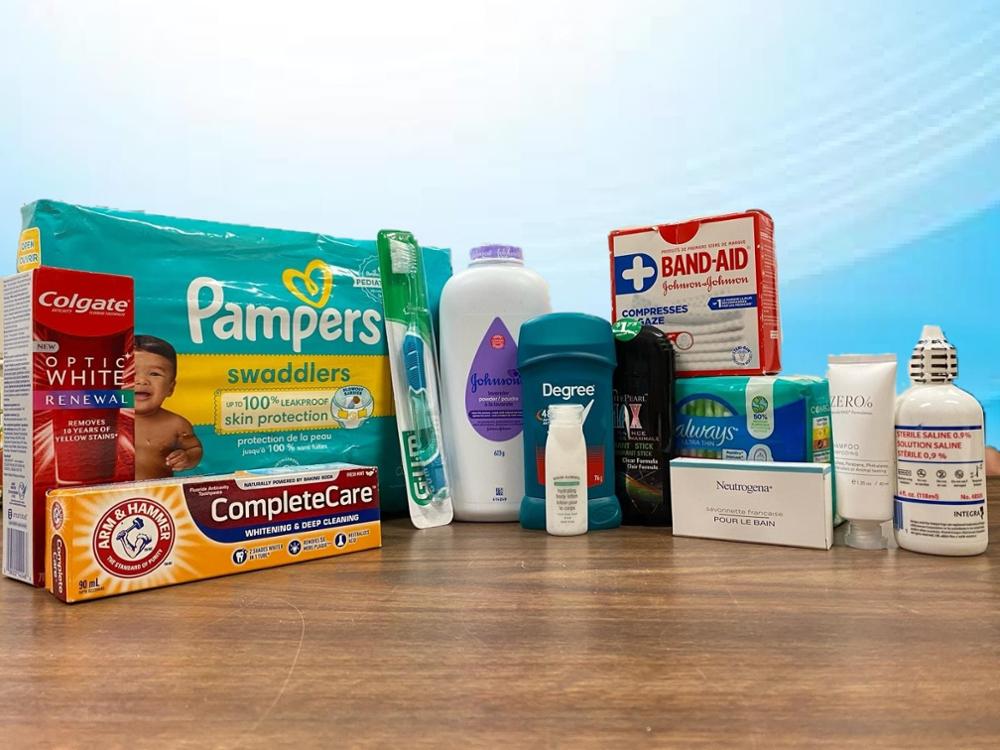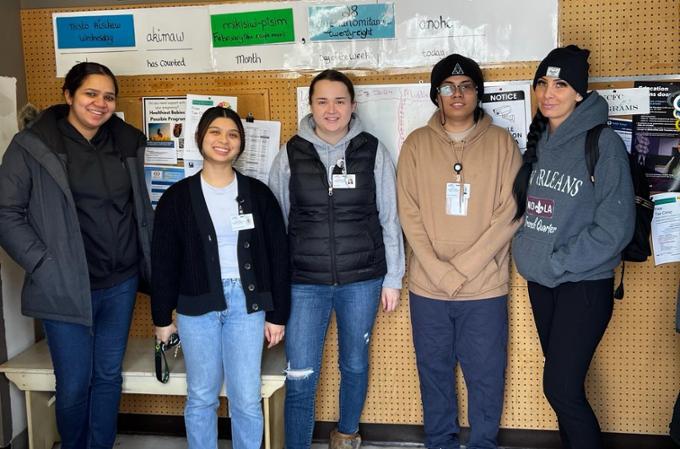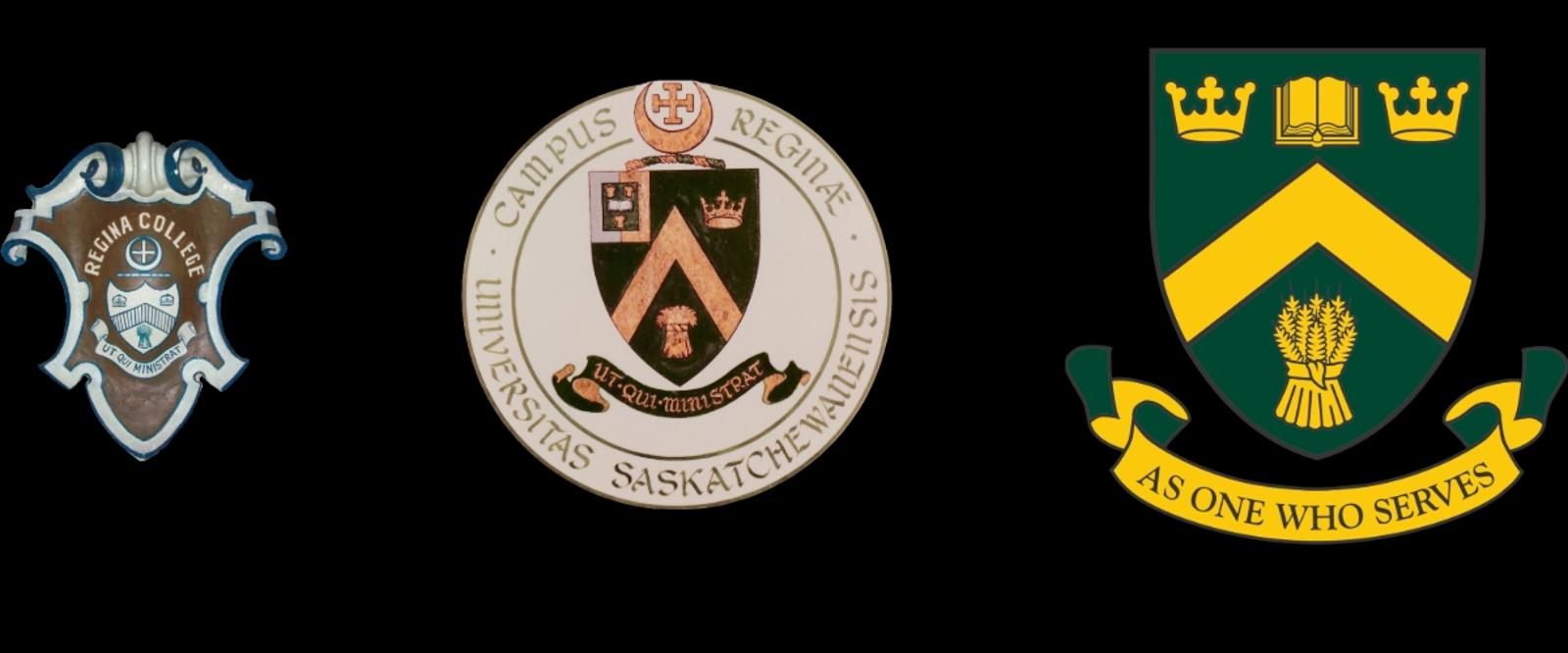For many of us a tube of toothpaste or a bar of soap are no further away than our local grocery store, but for many in urban and rural communities these items are considered luxuries beyond their reach.
A group of fourth-year nursing students want to change that.
The students, part of the Saskatchewan Collaborative Bachelor of Science in Nursing (SCBScN) program at the University of Regina and Saskatchewan Polytechnic, are collecting donations of personal hygiene products to distribute to North Central community members through their Community Partnerships placement at the North Central Family Centre (NCFC).
An important part of this clinical experience is that the students work with the community, not for the community. The community knows what community members need and want, and we build on that. — Crystal Tholl, Instructor with the Faculty of Nursing
The NCFC is a registered not-for-profit, charitable organization that offers Regina’s inner-city children, youth, families, and seniors a safe place, and the opportunity to participate in educational, sporting, recreational, social, and cultural programs and activities. Their vision is “to be a centre of excellence; empowering youth, families, and the community.”
Kelly Kay and six of her nursing classmates have been working with the NCFC since January and she says that many people living in a low socioeconomic state can often forgo meeting their hygiene needs to afford more essential needs, such as housing or food. When they aren’t busy with the hygiene product drive, Kay and her classmates work primarily with the After School Program. They have facilitated several different activities such as feminine hygiene and oral hygiene information sessions, cooking classes, and a trivia night.
“Food insecurity in North Central is quite high. Many people spend a lot of their day going around to different community organizations just to get food for themselves and their families,” says Kay. “After they put all of their focus and energy on finding food, they can overlook getting the hygiene products that they need as well.”

Credit: Photo provided by Kelly Kay.
When the hygiene product drive is complete, Kay and the other nursing students plan to put together bags of hygiene products, and give a bag to each child and youth that attends the NCFC’s After School Program. If there are any left over, they will go to the families, Elders, and other community members who visit the NCFC.
Hands-on learning within community
Community Partnership placements have long been a staple of both nursing and social work programs and immerse students in the community – putting theory into practice and providing meaningful experiential learning opportunities.
“Students gain so many skills while working at the North Central Family Centre and with the community members of North Central,” says Crystal Tholl, an Instructor with the Faculty of Nursing, who has been working with nursing students doing their Community Partnerships placement at the NCFC since 2019. “The Community Partnerships placement focuses on the many different policies and standards of practice that are expected of Registered Nurses.”
Tholl says that while students are at the NCFC, they have an opportunity to learn about how the social determinants of health (such as education, literacy level, and socioeconomic status) can affect communities. Working on the hygiene drive gives students an opportunity to advocate for the community.
Interested in a career in nursing? Find out more about the Saskatchewan Collaborative Bachelor of Science in Nursing (SCBScN), as well as all of the programs offered by the Faculty of Nursing.
“The students learn how to complete a community assessment, identify disparities and strengths, and make plans to apply interventions that support quality health,” says Tholl. “An important part of this clinical experience is that the students work with the community, not for the community. The community knows what community members need and want, and we build on that.”
You can help!
Donations for the hygiene product drive are being accepted until Wednesday, March 13. There is a serious need for baby-related items including formula, bottles, diapers, and wipes, as well as for the following items:
- Shampoo, body wash, soap, and lotion
- Feminine hygiene products
- Toothbrushes, toothpaste, and other oral care products
- Tissues and toilet paper
- First aid supplies and sunscreen
- Deodorant
- Combs and brushes
The NCFC also accepts donations of warm winter clothing and non-perishable food items.
Anyone interested in donating hygiene products can do so in the following ways:
- On-campus Drop Off in the Research and Innovation Centre (RIC), Room 508.37, between 9 a.m. and 5 p.m., Monday to Friday
- At the North Central Family Centre between 9 a.m. and 2 p.m., Monday to Friday
- By calling 306-209-2947 to organize a donation pick-up
Banner photo credit: Kelly Kay
About the University of Regina
2024 marks our 50th anniversary as an independent University (although our roots as Regina College date back more than a century!). As we celebrate our past, we work towards a future that is as limitless as the prairie horizon. We support the health and well-being of our 16,700 students and provide them with hands-on learning opportunities to develop career-ready graduates. Our research enterprise has grown to include 21 research centres and 12 Canada Research Chairs and brings in more than $51.2 million in funding annually. Our campuses are on Treaties 4 and 6 - the territories of the nêhiyawak, Anihšināpēk, Dakota, Lakota, and Nakoda peoples, and the homeland of the Michif/Métis nation. We seek to grow our relationships with Indigenous communities to build a more inclusive future.
Let’s go far, together.




